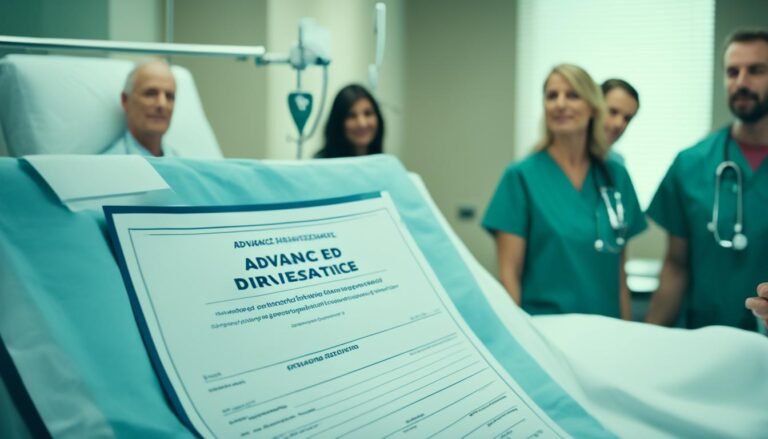Clinical Indemnity Scheme: Protecting Irish Healthcare Providers and Patients
In 2020, the pandemic created many challenges. The Medical Council finished 27 fitness to practice inquiries. These involved 311 doctors out of 279 complaints new complaints showed a critical need for solid regulations. The Clinical Indemnity Scheme (CIS) plays a big part in defending Ireland’s healthcare. It ensures public healthcare providers are safe from malpractice claims. This boosts patient safety in the long run.
The Clinical Indemnity Scheme was set up to give state indemnity in Ireland. It covers folks like doctors, dentists, pharmacists, nurses, and paramedics. By handling clinical negligence claims, CIS acts as a safety net. This lets healthcare providers give their best care, worry-free.
Key Takeaways
- The Clinical Indemnity Scheme supports the Irish healthcare system by covering negligence claims.
- It offers comprehensive protection for a wide range of healthcare professionals.
- Dr. K’s case highlights the financial burden of facing complaints without adequate indemnity.
- The COVID-19 pandemic didn’t stop the Medical Council from handling important fitness to practice inquiries.
- CIS coverage ensures patient safety and quality care by enabling healthcare providers to focus on their practice.
Understanding the Clinical Indemnity Scheme
In Ireland, the Clinical Indemnity Scheme provides healthcare liability coverage. It handles medical indemnity issues to better protect the healthcare system. This scheme is vital for keeping trust in Ireland’s medical sector strong.
Background and Establishment
The Clinical Indemnity Scheme (CIS) started in July 2002. It was a solution to the rising costs and difficulty in getting healthcare insurance. The scheme came about because some insurance companies stopped covering certain medical practices. They did this because court settlements for birth injuries had increased.
This program means the State, not private companies, deals with claims. It’s paid for as needed by the government. By doing this, the healthcare sector has steady insurance coverage. This setup helps keep medical services reliable for patients.
Scope of Coverage
The CIS covers public hospital work and Good Samaritan acts in Ireland. It includes many healthcare professionals like doctors, nurses, and public health experts. The scheme also looks after those involved in clinical trials, including treatment and services related to these projects.
However, it is important to note what the scheme does not cover. It doesn’t handle Employer’s Liability or Public Liability claims. This means healthcare workers might need extra insurance for certain situations.
Exclusions and Limitations
The CIS has its limits. It doesn’t cover General Practitioners unless they work for a covered group. It also does not include all private hospitals. In cases where the scheme doesn’t apply, health workers might need other insurance.
This is where groups like Medical Protection come in. They can fill the insurance gaps. So, healthcare professionals stay safe, no matter the scenario they face.
How the Clinical Indemnity Scheme Benefits Healthcare Providers
The Clinical Indemnity Scheme (CIS) gives vital protections to those in healthcare. It offers big liability coverage and strong legal defense. This scheme helps healthcare providers feel secure in their work, protecting them from lawsuits.
Liability Coverage
The CIS provides large liability coverage for healthcare providers. For certain specialities like obstetrics and neurosurgery, there’s a cap on claims. This cap is up to €600,471.66 per incident, with an annual cap of €1,801,415.01 per doctor. Other areas may get up to €1,200,943.34 per claim. This assures financial safety for those treating patients in state care from negligence lawsuits.
Legal Defense and Representation
Legal defense is key and covered by the CIS. It has a team of experts at the State Claims Agency (SCA) that help. They handle claims for clinical mistakes, protecting healthcare providers financially. Yet, there are some areas not covered, like complaints inside the office or criminal charges.
Risk Management and Support
Managing risks in healthcare is essential for keeping patients safe. The CIS helps providers to use the best practices. Members can attend workshops, get advice 24/7, and support Good Samaritan actions. These benefits promote safety and reduce risks in clinics.
Clinical Indemnity Scheme: Protecting Irish Healthcare Providers and Patients
The Clinical Indemnity Scheme (CIS) in Ireland is key to keep patients safe and improve healthcare quality. It started on February 1, 2004, and it makes sure consultants are protected from cases of possible clinical negligence since then.
Other healthcare workers like non-consultant doctors, nurses, midwives, and more are also covered. This includes those who are full-time, part-time, or on a temporary basis. Even dentists in public settings and health professionals like pharmacists and ambulance workers can rely on this important Scheme.
CIS is known for its tight focus on enhanced safety measures and reduced malpractice risk. It helps by giving support in personal injury cases that happen during emergencies. It does not cover cases outside of formal care settings. This really cuts down the chances of something going wrong.
It covers tough choices made by ethical, drug, and therapy committees that might affect patient safety. It also includes cases involving patients joining clinical research. By protecting in a wide range of medical situations, it’s clear Ireland is serious about patient safety. This shows how important it is for healthcare to follow set rules, as stated in The Health Care and Associated Professionals Order 2014.
In critical moments like Coroner’s Inquests, healthcare pros have support from the State Claims Agency if they’re under CIS. This kind of help means CIS doesn’t just shield healthcare workers. It also pushes for better practices and healthcare quality improvement.
Compared to the UK, where schemes cover different healthcare areas, CIS stands out. Although medical defense groups in other places may also offer protection, it’s the level of control and regular checks that make CIS special.
| Healthcare Sector | CIS Coverage |
|---|---|
| Consultants | Covered for incidents from 1 February 2004 |
| Non-Consultant Doctors | Covered |
| Nurses and Midwives | Covered |
| Dentists | Providing public practice |
| Pharmacists, Paramedics, Ambulance Personnel, Laboratory Technicians | Covered |
Being part of the Clinical Indemnity Scheme greatly improves patient safety and healthcare quality. It encourages better learning and managing risks before they become a problem. This Scheme is a big deal for both healthcare workers and the people they care for in Ireland.
The Role of the State Claims Agency in CIS
The State Claims Agency does a lot in the Clinical Indemnity Scheme (CIS). It manages clinical negligence claims and makes sure risk management in healthcare is top-notch. Its job is to help handle claims against public health organizations. This includes making sure patients get fair compensation for cases of clinical negligence.
There are around 146 groups that work under the Agency. They include public health doctors, nurses, and consultants. These healthcare workers get help managing claims and legal defense, leading to fair treatment. The main goal is to handle the state’s responsibilities well and solve matters fast to reduce any extra stress.
The SCA has a special team just for CIS. They do a lot to make sure CIS runs smoothly, like investigating claims, talking to different experts, and checking if there was a mistake, how it happened. They also look at the condition, what might happen, and figure out special costs.
The Expert Group said clear claim handling is key, leading to starting the pre-trial rules in March 2012. The Agency’s organized way improves how clinical claims are dealt with, making things better for everyone.
The Agency is also big on making a National Clinical Risk Management Strategy. They use a big database to keep track of bad things that happen in healthcare. This helps them get better at avoiding risks and making healthcare safer for both the healthcare workers and the patients.
Since it started, the Agency has worked hard to make things better in claims handling. They’ve been talking with the “Working Group on Medical Negligence and Periodic Payments” since February 2010. And there are monthly chats with the Expert Group from September 2018 to November 2019. Adding rules in 1998 for sharing expert reports early on hearing plans shows the Agency is in for the long haul, making sure the rules around clinical claims are the best they can be.
By doing a great job with clinical claims and having good plans, the State Claims Agency does its job. It doesn’t just meet its legal goals but also makes healthcare in Ireland safer and fairer for patients and healthcare workers.
The Impact of CIS on Patient Protection
In 2007, the Commission on Patient Safety and Quality Assurance began in Ireland. Its goal was to make the health service safer and deliver better care. After a year and a half of work, they made recommendations to improve patient safety. They showed where the system failed and pushed for a culture without blame for reporting mistakes.
Ensuring Compensation for Negligence
The Clinical Indemnity Scheme (CIS) is key in making sure patients get compensation for negligence. It helps people who’ve suffered due to medical errors get the support they need. With 2,840 cases to handle, valued at €1.159 billion, CIS shows the value of addressing these mistakes.
| 2008 | 2013 | 2014 | |
|---|---|---|---|
| Average award paid out (€) | 37,000 | 90,000 | 90,000 |
| Average legal fees for State Claims Agency (€) | 15,000 | 28,000 | 19,000 |
| Average Plaintiff legal fees (€) | 18,000 | 46,000 | 30,000 |
Promoting Safety and Quality Care
Creating a culture of patient safety and quality healthcare is at the heart of CIS’s work. The recommendations focus on better management, leadership, accountability, and communicating well with patients. By admitting to the system’s flaws and aiming for better, they are actively preventing future mistakes.
Reporting incidents under CIS is vital. It helps find areas of risk and pushes for improvements across the board. This teamwork between patients and healthcare providers is crucial for keeping up high standards and protecting Irish patients’ rights.
Conclusion
The Clinical Indemnity Scheme (CIS) has shaped Irish healthcare massively since 2002. It covers about 146 State authorities, dealing with clinical negligence claims. CIS is crucial for managing risks in healthcare. It ensures clinical staff in various fields are protected and has been doing so since 2004.
The State Claims Agency works hard with these claims, focusing on sensitive handling, such as in severe injury cases. With its team of experts, the Agency minimizes the State’s financial risks. It’s known for settling cases quickly, in about ten weeks, which is much faster than the typical two to three years.
This quick resolution reduces negative financial impacts and ensures fair outcomes. A drop in settlement demands after court hearings proves this. The Agency’s goal is to keep the State’s costs low while providing just settlements.
Mr. Justice Charles Meenan leads the Expert Group striving to improve Ireland’s clinical indemnity system. It includes members from Health, Justice, HSE, and State Claims Agency. The Group plans to make big suggestions within six months.
Their focus is on new laws that would help save money and work more effectively. This is beneficial for healthcare workers and patients. The CIS will keep offering crucial support in healthcare. It’s a key part of ensuring Ireland’s healthcare continues to progress and keep patients safe.
Source Links
- HSE doctors: Are you really protected? – Medical Independent
- Membership for doctors in the Republic of Ireland
- RDJ LLP | Healthcare Litigation | Hospital Legal Advice at RDJ LLP
- Medicolegal articles for doctors in Ireland
- 9476_CIS _A/W.qxd
- The Clinical Indemnity Scheme – why it is not enough to protect consultants in Ireland
- NHS medical indemnity
- Clinical Indemnity Survey Report
- State Indemnity Frequently Asked Questions – 0fe6d7d06a.nxcli.net
- Clinical Indemnity For Neurosurgeons | THEMIS
- GMC guidance on professional indemnity
- Evaluation Practices Report
- untitled
- Medical Indemnity Insurance
- NMBI – The Code – Principle 2: Professional responsibility and accountability








